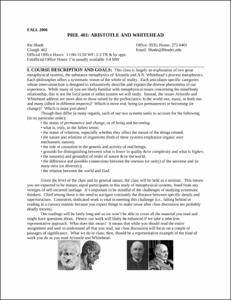Please use this identifier to cite or link to this item:
http://hdl.handle.net/10267/3515Full metadata record
| DC Field | Value | Language |
|---|---|---|
| dc.contributor.author | Shade, Patrick A. | - |
| dc.date.accessioned | 2009-02-27T17:28:07Z | - |
| dc.date.available | 2009-02-27T17:28:07Z | - |
| dc.date.issued | 2006-08-24 | - |
| dc.identifier.uri | http://hdl.handle.net/10267/3515 | - |
| dc.description | This syllabus was submitted to the Rhodes College Office of Academic Affairs by the course instructor. | en_US |
| dc.description.abstract | This class is largely an exploration of two great metaphysical systems, the substance metaphysics of Aristotle and A.N. Whitehead’s process metaphysics. Each philosopher offers a systematic vision of the whole of reality. Each articulates specific categories whose interconnection is designed to exhaustively describe and explain the diverse phenomena of our experience. While many of you are likely familiar with metaphysical issues concerning the mind/body relationship, this is not the focal point of either system we will study. Instead, the issues Aristotle and Whitehead address are more akin to those raised by the preSocratics: Is the world one, many, or both one and many (albeit in different respects)? Which is more real, being (or permanence) or becoming (or change)? Which is more prevalent? Though they differ in many regards, each of our two systems seeks to account for the following (in no particular order): • the status of permanence and change, or of being and becoming; • what is, truly, in the fullest sense; • the status of relations, especially whether they affect the nature of the things related; • the nature and relations of organisms (both of these systems emphasize organic over mechanistic nature); • the role of causation in the genesis and activity of real beings; • grounds for distinguishing between what is lower in quality &/or complexity and what is higher; • the nature(s) and ground(s) of order of nature &/or the world; • the difference and possible connections between the oneness (or unity) of the universe and its many-ness (or diversity); • the relation between the world and God. Given the level of the class and its general nature, the class will be held as a seminar. This means you are expected to be mature, equal participants in this study of metaphysical systems, freed from any vestiges of self-incurred tutelage. It’s important to be mindful of the challenges of studying systematic thinkers. Chief among these is the need to navigate constantly the distance between specific details and superstructure. Consistent, dedicated work is vital in meeting this challenge (i.e., falling behind or reading in a cursory manner because you expect things to make sense after class discussion are probably deadly moves). Our readings will be fairly long and so we won’t be able to cover all the material you read and might have questions about. Hence, our work will likely be enhanced if we take a selective, representative approach. What does this mean? It means that while you should read the entire assignment and seek to understand all that you read, our class discussion will focus on a couple of passages of significance. What we do in class, then, should be a representative example of the kind of work you do as you read Aristotle and Whitehead. | en_US |
| dc.language | English(United States) | - |
| dc.language.iso | en_US | en_US |
| dc.publisher | Memphis, Tenn. : Rhodes College | en_US |
| dc.relation.ispartofseries | Syllabi CRN | en_US |
| dc.relation.ispartofseries | 17413 | en_US |
| dc.rights | Rhodes College owns the rights to the archival digital images in this repository. Images are made available for educational use only and may not be used for any non-educational or commercial purpose. Approved educational uses include private research and scholarship, teaching, and student projects. For additional information please contact archives@rhodes.edu. Fees may apply. | - |
| dc.subject | Philosophy, Department of | en_US |
| dc.subject | Syllabus | en_US |
| dc.subject | Curriculum | en_US |
| dc.subject | Academic departments | en_US |
| dc.subject | Text | en_US |
| dc.subject | 2006 Fall | en_US |
| dc.title | PHIL 401-01, Aristotle and Whitehead, Fall 2006 | en_US |
| dc.type | Syllabus | en_US |
| Appears in Collections: | Course Syllabi | |
Files in This Item:
| File | Description | Size | Format | |
|---|---|---|---|---|
| 2006_fall_PHIL_401-01_17413.pdf | 53.99 kB | Adobe PDF |  View/Open |
Items in DSpace are protected by copyright, with all rights reserved, unless otherwise indicated.